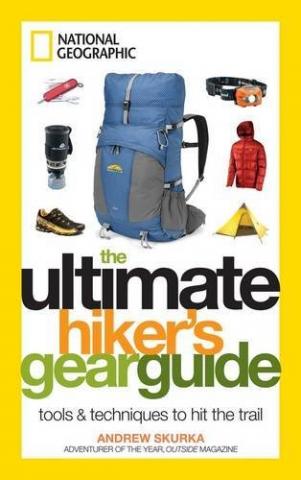You would think someone who has circumnavigated Alaska by foot, skis, and raft would know a little something about backpacking gear, and Andrew Skurka certainly does.
Whereas Colin Fletcher became the guru of the backpacking movement after he walked through Grand Canyon National Park and wrote The Completer Walker, Mr. Skurka could be viewed not as the ultimate gear geek, but as the ultimate gear guru, full of wisdom, suggestions, and tips you can benefit from whether you're planning a weekend outing to your nearest state park or intend to hike the Appalachian National Scenic Trail end-to-end.
In a new book from National Geographic, The Ultimate Hiker's Gear Guide, Mr. Skurka has packaged his wisdom in a handy paperback that should be your first reference when contemplating what to buy for your next outdoor adventure.
Within its pages you'll find a little philosophy, such as why hiking can help your relationships: "On a hiking trip, routines like work, housekeeping, and TV watching don't get between people. Earlier this summer, several weekend trips helped to save my relationship with my girlfriend, who rightly felt that this book was getting in our way. Sharing a steaming pot of tortellini and dehydrated cream sauce before retiring to a floorless tarp was not terribly romantic, but it was a refreshing break from the demands that were preocupying me.""
And you'll come to understand the virtues of a 1-pound tarp over a 4+-pound double-wall tent: "It (the tarp) can offer complete protection against precipitation, wind, and bugs. A tarp system can also ventilate extremely well, so it is more condensation-resistant; with just the slightest breeze, dry outside air will take the place of humid interior air."
But Mr. Skurka also offers some unorthodox gear solutions. His "Fancy Feast alcohol stove," for example, is nothing more than a cat food can punched with some holes and fueled with either denatured alcohol or, believe it or not, liquid HEET, which you normally use as gas line antifreeze. Not something I would resort to, but definitely low-budget and, apparently, effective.
No doubt, much of the mojo behind Mr. Skurka's book is his trail cred -- he has logged more than 25,000 trail miles since 2002, and his last big adventure was a 4,679-mile trek around Alaska that took him nearly six months, a walk that earned him Adventurer of the Year honors from Outside Magazine. With that kind of resume, you have to believe he's tested a lot of gear out in the field.
Though writing a book is a skill that doesn't come easily to all, Mr. Skurka seems to take to it as easily as he negotiates the Continental Divide Trail ("Even the Continental Divide Trail, one of the most challenging trails in the country, has frequent signs, cairns, and emblazoned posts," he writes).
Chapters include sections on how to tell whether you're a hiker or a camper and a breakdown of all the necessities of trail life, from clothing, shelters, cooking systems and "small essentials," such as dental floss (great for oral hygiene, and for repairs, too!), to headlamps, and even bear spray.
Of course, there also is a chapter on packing your gear, a section that opens with the author's thoughts on the two types of backpacks -- frameless and framed with suspension systems -- and then moves into load organization. Among the tips he offers here is forget spending the extra $20-$40 for a waterproof pack cover because they are not 100 pecent waterproof -- "...precipitation seeps inside after dripping down the user's neck and back" -- and add extra weight. Better to simply line the inside of your back with a 20-gallon trash bag made with 2-milimeter polyethylene film.
Along with recommending specific pieces and manufacturers of gear, Mr. Skurka provides "sample gear kits" if your trip is through eastern forests, the mountain west (a region that ranges from the Rockies to the North Cascades), the desert southwest, or even the Philmont Boy Scout Ranch.
While you could read this book cover-to-cover, and perhaps that's the best way to come to understand everything it offers, you also can resort to diving into specific sections if you're wondering what type of cooking system to buy, how to lose a few pounds from your load, or whether you really need a GPS unit on your belt as you head down the trail.
Traveler footnote: If this book intrigues you, and you want to help out the Traveler, click through to Amazon from this page, as we'll get a small commission.








Add comment